The registration for the one-day event, ‘Geriaction Cinema: A Symposium on the Ageing Action Star’ is now open. Please follow the link for the registration page and further information:
Yearly Archives / 2018
Good Clinical Practice (GCP) training – 15th May 2018
Are you thinking of undertaking clinical research, and wish to branch out into the NHS? If you are, then you will need Good Clinical Practice (GCP) training.
GCP training is the international ethical, scientific and practical standard to which all clinical research is conducted. Compliance with GCP provides public assurance that the rights, safety and well-being of research participants are protected and that research data are reliable.
GCP courses are free to book onto, and can either be done online or face-to-face. Luckily, the next face-to-face session is scheduled to take place at the Lansdowne Campus, on Tuesday 15th May, 08:45am – 16:30pm, room to be confirmed.
If you would like any more information about the training and its content, or wish to book on, please contact researchethics@bournemouth.ac.uk
BU’s ECR Network – Come to the pre-launch event, this week, on 25th April
TODAY! Come along if you are available:
BU will be launching a new network for Early Career Researchers later in 2018
If you are an ECR* or interested in the development of ECRs at BU, please sign up to attend this pre-launch meeting to discuss your ideas and expectation of this new network. Priority will be given to ECRs in the first instance, but whatever your role at BU, please join us as your input will be most welcome.
This session will take place on Talbot Campus in Fusion – FG04 on Wednesday, 25th April, from 13:00 – 15:00, with refreshments, but not lunch, provided. Please feel free to bring your lunch.
*an ECR, in this case, is defined as someone who started their research career on or after 1 August 2013. This is the point at which they held a contract of employment of 0.2 FTE or greater, which included a primary employment function of undertaking ‘research’ or ‘teaching and research’, with any HE or other organisation, whether in the UK or overseas.
ICB Research Cluster Sandpit (Trust Repair, Food Waste, B2B Marketing)
The Influences on Consumer Behaviour research cluster will be holding a small series of research sandpits over the coming months on key topics of research that have emerged from their work over the past 5 years. The first of these on Wednesday 16th May 2018 3-4.30pm will focus on the areas of Trust Repair, Food Waste, and B2B Marketing. The aim of the event is to introduce the clusters work in these areas, discuss them further and share knowledge/expertise within the audience, before looking for opportunities for within- and cross-faculty collaborations in similar or complementary areas that could result in collaborative projects, papers, bids, etc. All are welcome to come along and join in discussions, although tickets are limited. Tea and coffee will be provided. The event is free, but please sign up via Eventbrite by Sunday 13th May 2018 so we can manage refreshment numbers.
https://icbcluster.eventbrite.co.uk
ADRC and HEE showcase ‘DEALTS 2’ at ‘Dementia 2020: The Next Phase’ in London
 On Tuesday 17th April 2018, the Ageing and Dementia Research Centre (ADRC) were invited to join Health Education England (HEE) to showcase the Dementia Education and Learning Through Simulation 2 (DEALTS 2) programme at ‘Dementia 2020: The Next Phase’ in London. The event, hosted by Govconnect, provided an opportunity to consider progress on the ‘Challenge Dementia 2020 Implementation Plan’ assessing whether commitments have been meet so far. Commitments of the plan aspire to make England the best country in the world for: dementia care and support; for people with dementia to live; and to conduct dementia research.
On Tuesday 17th April 2018, the Ageing and Dementia Research Centre (ADRC) were invited to join Health Education England (HEE) to showcase the Dementia Education and Learning Through Simulation 2 (DEALTS 2) programme at ‘Dementia 2020: The Next Phase’ in London. The event, hosted by Govconnect, provided an opportunity to consider progress on the ‘Challenge Dementia 2020 Implementation Plan’ assessing whether commitments have been meet so far. Commitments of the plan aspire to make England the best country in the world for: dementia care and support; for people with dementia to live; and to conduct dementia research.
In 2016, HEE commissioned a team from Bournemouth University (BU) to develop and evaluate DEALTS 2. DEALTS 2 is a simulation-based dementia education programme for staff in acute hospitals across England. It is based on an experiential learning approach, placing hospital staff into the shoes of a person with dementia, to facilitate a positive impact on practice. The training is mapped against a selection of core competencies for staff with regular contact with people with dementia (Tier 2) and underpinned by the Humanising Values Framework a philosophical lens originally developed at BU. The team, Dr Michelle Heward, Dr Michele Board, Ashley Spriggs and Prof Jane Murphy, delivered DEALTS 2 as a train-the-trainer model across England in 2017 to 196 trainers from 13 HEE Local Education Boards, and are continuing to evaluate the impact on practice.
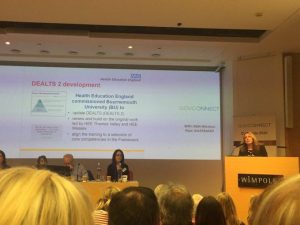
The DEALTS 2 programme was showcased as a case study at the Dementia 2020 event in a presentation given by Jan Zietara the Head of Programme Delivery for HEE. Dr Michelle Heward represented the ADRC at the event which provided an opportunity to connect with members of key organisations involved in delivering the Implementation Plan for Dementia 2020, as well as people with dementia, caregivers and individuals interested in dementia care and support more broadly.
The event was co-chaired by George Rook an advocate who himself lives with dementia, and Rachel Thompson the Professional and Practice Lead for Dementia UK. Throughout the event a range of speakers updated the audience on progress including: Jeremy Hughes CBE, Chief Executive, Alzheimer`s Society; David Nuttall, Deputy Director – Dementia Policy, Department of Health; and Dr Charles Alessi Senior Advisor and Lead for Dementia, Public Health England. It has to be said though that Suzy Webster who is a caregiver for her mother who has dementia gave the most heartfelt speech reminding us that policy is necessary but it is now time to see action on the ground to improve care and support for people with dementia – not a dry eye was left in the house!
Discussion on the day focused on celebrating the small steps forward that have been taken, whilst being mindful that there remains some way to go to meet the commitments outlined in the plan by 2020.
ADRC Research Seminar Series 25/04/18
You are cordially invited to this seminar which is open to all BU staff and students.
Wednesday 25th April 2018
2 – 3.30 pm
F307, Fusion Building, Talbot Campus
‘Representing Dementia in Film and Fiction’ Dr David Orr, University of Sussex and Dr Yugin Teo, Bournemouth University
From something that was ‘not really talked about’ publicly, the last two decades have seen dementia explode into the public sphere and contemporary culture’s creative imaginary. Cinema, documentary, theatre, art, memoirs, biography, poetry, literary fiction and genre fiction have all taken up dementia as a prominent theme. The gerontological humanities have been exploring what these works reveal of the experiences, preoccupations, dilemmas and misapprehensions to which dementia gives rise. This presentation discusses selected examples of engagement with dementia within (1) cinema and (2) crime fiction, asking how these narratives might reflect and shape audience perceptions of living with the condition.
Biographies
Dr David Orr is Senior Lecturer in Social Work at the University of Sussex, where his principal research interests focus on adult safeguarding and self-neglect, global mental health, and representations of dementia in contemporary films and fiction. He has worked on a number of knowledge reviews for the Social Care Institute for Excellence (SCIE) and is co-editor of the Palgrave Handbook of Sociocultural Perspectives on Global Mental Health. Before entering academia, he worked in Community Mental Health Teams in the areas of Adult Learning Disability and Older Adult Mental Health.
Dr Yugin Teo is Lecturer in English and Communication at Bournemouth University. He has previously taught literature and film at the University of Brighton and the University of Sussex where he completed his doctorate. His research on the representation of memory in literature and film has been published in the journals Critique, Medical Humanities and Science Fiction Film and Television. His research monograph Kazuo Ishiguro and Memory was published by Palgrave Macmillan in 2014.
‘Ethnography of the Environment of Hospital Wards for Patients with Dementia, and the Role in which Music Can Play Within this’ Rosanna Mead, University of Exeter
Rosanna Mead discusses her PhD research exploring how music can play a role within acute hospital ward environments for patients with dementia, with a specific focus on agitation and methods to measure levels of agitation in patients with dementia, in relation to environmental factors. She draws on findings from her ethnographic study conducted within two acute hospital wards for patients with dementia, exploring the link between environments and health, considering health/illness states as something which can fluctuate in relation to the environment, and within this gaining a grounded understanding of the interaction between agitation and the environment.
Biography
Rosanna Mead is a PhD Candidate at the University of Exeter in the Sociology Department, under the supervision of Professor Tia DeNora and Dr Hannah Farrimond. She is also the Director of Dorset based social enterprise Musica Music and Wellbeing.
BRIAN Upgrade – Next Week!
 BRIAN will be upgrading to a new version next week, so will be inaccessible to users on Monday 30th April and Tuesday 1st May.
BRIAN will be upgrading to a new version next week, so will be inaccessible to users on Monday 30th April and Tuesday 1st May. All relevant guidance notes and video guides on the Staff Intranet will be updated in due course. If you need any help using the new system or if you encounter any problems after the upgrade, please do send an email to BRIAN@bournemouth.ac.uk and a member of staff will be able to assist you.
BRIAN training sessions are also available every two months and are bookable through Organisational Development . The next session scheduled is:
- Wednesday 20th June 2018
In the meantime, if you do have queries relating to the upgrade, please get in touch with BRIAN@bournemouth.ac.uk
SciTech PGR Aishah Selamat awarded with UK Data Service Data Impact Fellowship Award

In September 2017, the UK Data Service (UKDS) announced the appointment of its second Data Impact Fellows for 2017-2018. Aishah Selamat from the Faculty of Science and Technology, Creative Department, was amongst the selected researchers from the United Kingdom universities.
An open competition for Ph.D. and post-doctoral researchers, the UKDS Data Impact Fellows programme is outlined to support the usage of UKDS data (and its resources) from the new generation of scholars. Each year, UKDS received high qualities of applications, making the selection a tougher job for the judges.
Aishah Selamat is BU first PGR to be awarded the competitive UK Data Service Impact Fellowship Award. The value of £2000 grant would provide Aishah Selamat the opportunities to carry out impactful public engagements, cover the course of her article publication or participate in an international conference. Over the course of two years, Aishah Selamat role as UKDS Data Impact Fellow includes blogs contribution to UKDS blog, develop an impactful case study contribution and becomes a data citation practitioner.
Read Aishah’s first blog post contribution on UKDS here.
PGR supervisory team consist of Dr. Simant Prakoonwit, Dr. Reza Sahandi & Dr. Wajid Khan
CEMP research for Samsung published in Learning, Media and Technology.
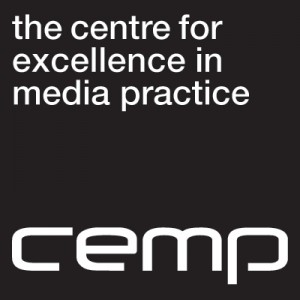
CEMP’s research into Digital Capabilities, funded by Samsung, has now been published in the journal Learning, Media and Technology.
Julian McDougall, Mark Readman & Philip Wilkinson (2018): The uses of (digital) literacy, Learning, Media and Technology, DOI: 10.1080/17439884.2018.1462206
Lunchtime Seminar Wednesday, 25th April: Impact case studies? – Lessons from REF 2014
You are cordially invited to this lunchtime seminar which is open to all students and staff.
Please feel free to bring your lunch.
Wednesday 25th April 2018
1.00 pm – 1.50 pm
Studland House, S217
So you are interested in developing an impact case study? Lessons from REF2014
by Prof Vanora Hundley, Prof Alison McConnell and Prof Edwin van Teijlingen
Impact case studies have become an important part of research assessment; in REF2021 impact case studies will account for 25% of the overall score for an institution. This session will provide an overview of case studies; focusing on how to build a strong case study and, perhaps more importantly, how to avoid some of the pitfalls of REF2014. The session will draw on an example from Brunel’s submission and one from BU. The presenters aim to promote discussion on the nature of impact (REF or otherwise) and potential among FHSS academics to promote the impact of their research.
CIPPM Co-Director Professor Dinusha Mendis and Team Secures European Commission Funding for Research into 3D Printing and IP Law
A project exploring the ‘Study into the Intellectual Property Implications of the Development of Industrial 3D Printing’ was awarded by the European Commission to the Centre for Intellectual Property Policy and Management (CIPPM) in April 2018.
The project led by Co-Director of CIPPM, Professor Dinusha Mendis (Principal Investigator), also includes Dr. Julie Robson, Associate Professor, Marketing (Co-Investigator), Dr. Marc Mimler, Lecturer in Law (Member of Advisory Board), Dr. Sally Weston, Senior Principal Academic in Law (Member of Advisory Board) and Mr. Dukki Hong, PhD Candidate, CIPPM (Research Assistant).
Apart from members of CIPPM, this one-year project also includes partners from UK (University of Glasgow; Added Scientific Ltd), Austria (Technopolis Group), Finland (University of Lapland) and Germany (Boehmert & Boehmert).
The project aims to provide an overview of the past and current industrial applications of Additive Manufacturing (AM) in selected sectors whilst identifying potential challenges and opportunities in need of clarification. In essence, the Study will aim to formulate a clear picture of the Intellectual Property (IP) framework that could enhance the competitiveness of the AM sector in Europe.
Submissions for the AHRC Research in Film Awards 2018 are now open
 The Art & Humanities Research Council (AHRC) Research in Film Awards have returned for their fourth year which aim to showcase new and emerging talent in film-making linked to arts and humanities research and celebrate the best of a growing number of high-quality short films (defined as no more than 30 minutes in length) that bring research to a wider public audience.
The Art & Humanities Research Council (AHRC) Research in Film Awards have returned for their fourth year which aim to showcase new and emerging talent in film-making linked to arts and humanities research and celebrate the best of a growing number of high-quality short films (defined as no more than 30 minutes in length) that bring research to a wider public audience.
The Awards offer a unique opportunity for filmmakers working in the field of research to showcase their talent, while acknowledging the UK’s leading arts and humanities researchers and practitioners.
Categories
This year, there are two new categories including “People on the Move: Stories of New Beginnings” which aims to showcase the contribution of migration and its impact on places and communities, and the “Social Media Short Award”, which recognises the increasing importance of social media as a channel for telling the story of research via short films.
- Best Research Film of the Year
- Doctoral Award or Early Career Film
- People on the Move Award: Stories of New Beginnings
- Social Media Short Award
- Inspiration Award (A public category inspired by arts and humanities. This could be a book, play, performance or exhibition which has fired the imagination.)
The films will be judged by a panel of academic and film industry experts, chaired by Jan Dalley, Arts Editor of the Financial Times.
The winning filmmakers in each category will receive £2,000 towards their film-making activities and will be honoured at an awards ceremony on Thursday 8 November at the prestigious 195 Piccadilly in London, the home of BAFTA.
Previous Research in Film Awards winners have gone on to produce further films as a result of the exposure or have gone on to secure funding, impact policymaking and secured airtime on national radio.
The competition closes on Thursday 14 June at 16:00 hours. Find out how to apply here.
Follow @ahrcpress on Twitter and use the hashtag #RIFA2018 to let them know you’ve entered.
Apply for LIFE funding
 The LIFE programme is the EU’s funding instrument for the environment and climate action. The general objective of LIFE is to contribute to the implementation, updating and development of EU environmental and climate policy and legislation by co-financing projects with European added value.
The LIFE programme is the EU’s funding instrument for the environment and climate action. The general objective of LIFE is to contribute to the implementation, updating and development of EU environmental and climate policy and legislation by co-financing projects with European added value.
In April 2018, The LIFE programme has launched its 2018 call for project proposals. This year, they are investing close to €400 million in nature conservation, environmental protection and climate action. They are also introducing a streamlined application process to make it easier to request LIFE funds.
As a bottom-up funding instrument, LIFE provides applicants with flexibility to truly innovate. The LIFE Programme supports projects that are either tackling climate change, or protecting nature and the environment.
See more funding information – “Traditional Projects” under the LIFE sub-programme for Environment and the LIFE sub-programme for Climate Action – various calls with concept note closing dates of 12th / 14th June and 12th September, depending on the call guidance.
LIFE are also hosting an Information Day in Brussels on 4/5/18, with registrations open until 2/45/18.
For the UK perspective, please go to the UK LIFE website.
BU staff wishing to apply should contact the relevant member of RKEO for their faculty.
British Academy Small Grant Call – NOW OPEN

The call for the next round of BA/Leverhulme Small Research Grants is open. The call closes at 5pm on Wednesday 6th June 2018.
The British Academy have provided updated guidance on the small grants – BA scheme notes for applicants and BA FAQs . They have asked that all applicants read the documentation carefully before starting their application.
Due to the expected high demand, we ask that if you are interested in applying to this call then please send your intention to bid form to your Funding Development Officer by 2nd May, after this date no new applications will be accepted.
Timeline
The call closes at 5pm on Wednesday 6th June 2018.
| 11th April 2018 | Call Opens – start reading guidance |
| 2nd May 2018 | Intention to bid forms to be submitted to your faculty funding development officer. |
| 31st May 2018 | Nominated referee supporting statement to be completed via FlexiGrant |
| 30th May 2018 | Your final application must be submitted on FlexiGrant by this date at the latest. |
| 31st May -6th June 2018 | Institutional checks to take place by RKEO |
Royal Academy of Engineering Research Fellowship Interview Training – Book Now
Royal Academy of Engineering Research Fellowship Interview Training
Monday, 14th May 2018 – 09:30-16:00
 This workshop is aimed primarily at ECRs but may be of benefit to academics and researchers wishing to apply for RAE fellowships that require an interview. This intensive event will introduce the Royal Academy of Engineering Research Fellowship scheme and go through eligibility, requirements and assessment criteria.
This workshop is aimed primarily at ECRs but may be of benefit to academics and researchers wishing to apply for RAE fellowships that require an interview. This intensive event will introduce the Royal Academy of Engineering Research Fellowship scheme and go through eligibility, requirements and assessment criteria.
Attendees will think about how they fulfil these criteria, start to plot ideas for a proposal and consider whether the Fellowship is right for them. There will even be a chance to practice interview skills so you’ll get an insight into every step of the application process.
For the future, there will also be a similar workshop for the Royal Society on 5th July 2018. You can book now for that event too.
CMMPH PhD student Preeti Mahato publishes latest paper on Nepal
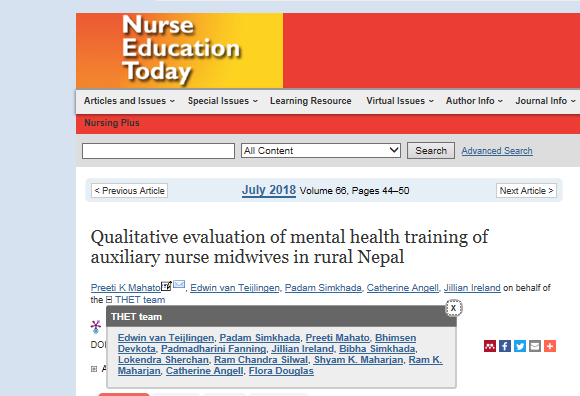 This week saw the pre-publication of ‘Qualitative evaluation of mental health training of auxiliary nurse midwives in rural Nepal’ in the international journal Nurse Education Today (published by Elsevier). The paper is a report of an evaluation of a THET-funded projectwhich run from 2015 to 2017. Bournemouth University led a team comprising Liverpool John Moores University and Tribhuvan University (the oldest university in Nepal). These three universities worked together on a training project of Auxiliary Nurse Midwives in Nawalparasi focusing on key aspects of mental health and mental health promotion. The project was funded under the Health Partnership Scheme (HPS) which is managed by a London-based organisation called THET (Tropical Health & Education Trust).
This week saw the pre-publication of ‘Qualitative evaluation of mental health training of auxiliary nurse midwives in rural Nepal’ in the international journal Nurse Education Today (published by Elsevier). The paper is a report of an evaluation of a THET-funded projectwhich run from 2015 to 2017. Bournemouth University led a team comprising Liverpool John Moores University and Tribhuvan University (the oldest university in Nepal). These three universities worked together on a training project of Auxiliary Nurse Midwives in Nawalparasi focusing on key aspects of mental health and mental health promotion. The project was funded under the Health Partnership Scheme (HPS) which is managed by a London-based organisation called THET (Tropical Health & Education Trust).
Mental illness is increasingly recognized as a global health problem. However, in many countries, including Nepal, it is difficult to talk about mental health problems due to the stigma associated with it. Hence a training programme was developed to train auxiliary nurse midwives, who otherwise are not trained in mental health as part of their pre-registration training in rural Nepal, on issues related to maternal mental health. After the training programme a selection of auxiliary nurse midwives were interviewed to establish their views on the training, its usefulness and ways to improve it.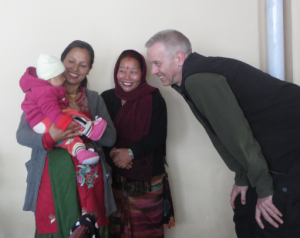
Preeti Mahato is a PhD student in the Centre for Midwifery, Maternal & Perinatal Health (CMMPH) who undertook an in-depth evaluation of our project as part of her PhD research. This qualitative study has three themes emerging: (1) issues related to training; (2) societal attitudes; and (3) support for women. The ‘training’ theme describes the benefits and limitations of training sessions. ‘Societal attitudes’ describes society’s attitude towards mental health which is largely negative. ‘Support’ describes the positive behaviour and attitude towards pregnant women and new mothers.
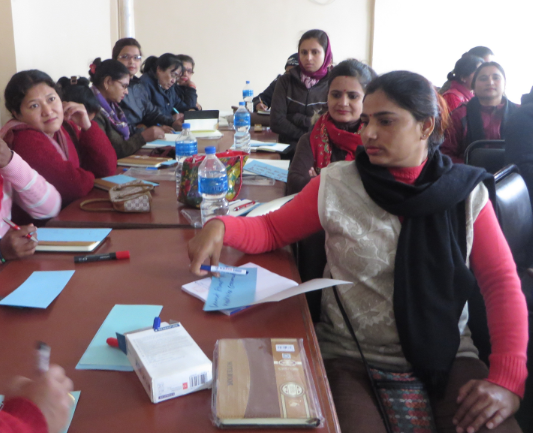 The paper concludes that there is a need for continued training for auxiliary nurse midwives who are based in the community. This gives them the opportunity to reach the whole community group and potentially have influence over reduction of stigma; offer support and diagnosis of mental ill-health. There is still stigma around giving birth to a female child which can lead to mental health problems. It is imperative to increase awareness and educate the general public regarding mental health illnesses especially involving family members of those who are affected.
The paper concludes that there is a need for continued training for auxiliary nurse midwives who are based in the community. This gives them the opportunity to reach the whole community group and potentially have influence over reduction of stigma; offer support and diagnosis of mental ill-health. There is still stigma around giving birth to a female child which can lead to mental health problems. It is imperative to increase awareness and educate the general public regarding mental health illnesses especially involving family members of those who are affected.
Reference:
- Mahato, P., van Teijlingen, E., Simkhada, P., Angell, C., Ireland, J. on behalf of THET team (2018) Qualitative evaluation of mental health training of Auxiliary Nurse Midwives in rural Nepal. Nurse Education Today 66: 44-50. http://www.nurseeducationtoday.com/article/S0260-6917(18)30150-3/abstract
CQR’s Ellis-Hill to Keynote in Oz

 The Centre for Qualitative Research is pleased to announce that its Deputy Director, Caroline Ellis-Hill, will be keynoting at the 41st ASSBI Annual Brain Impairment Conference in Adelaide, Australia on the 4th -5th May 2018. Ellis-Hill will speak on “Lifeworld-led rehabilitation – a new approach to support psycho-social well-being following brain injury”.
The Centre for Qualitative Research is pleased to announce that its Deputy Director, Caroline Ellis-Hill, will be keynoting at the 41st ASSBI Annual Brain Impairment Conference in Adelaide, Australia on the 4th -5th May 2018. Ellis-Hill will speak on “Lifeworld-led rehabilitation – a new approach to support psycho-social well-being following brain injury”.
Caroline remarks: “A lifeworld–led approach to rehabilitation has a very different underlying logic and offers us the ability to prioritise subjective experience which in turn creates new understandings and connections. Our lifeworld is our everyday flow of life as we experience it, or what our life feels like from the inside out”.
We wish Caroline a safe and fruitful trip to Australia!
4 Weeks Left – Call for Applications: Three Minute Thesis Competition
Do you want to share your research? All the hard work shouldn’t go unheard!
If you have any questions please contact Natalie or Clare
pgrskillsdevelopment@bournemouth.ac.uk
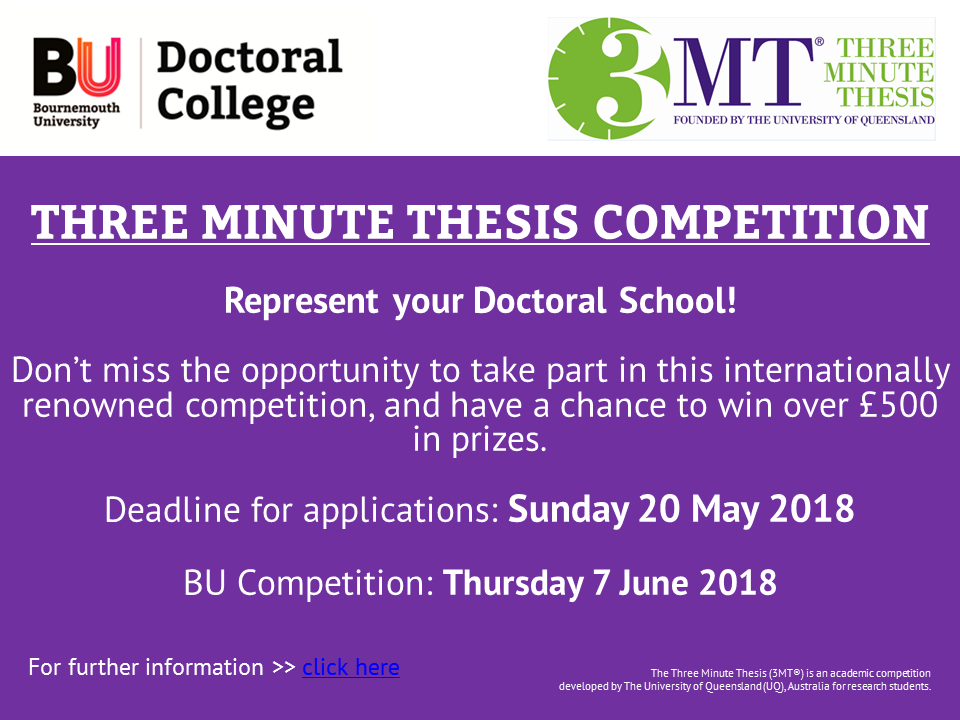











 Fourth INRC Symposium: From Clinical Applications to Neuro-Inspired Computation
Fourth INRC Symposium: From Clinical Applications to Neuro-Inspired Computation Writing policy briefs
Writing policy briefs Upholding Excellence: The Concordat to Support Research Integrity
Upholding Excellence: The Concordat to Support Research Integrity Today’s Documentation Will Serve Tomorrow’s Justice
Today’s Documentation Will Serve Tomorrow’s Justice Up2U: New BU academic publication
Up2U: New BU academic publication New BU midwifery paper
New BU midwifery paper ECR Funding Open Call: Research Culture & Community Grant – Application Deadline Friday 12 December
ECR Funding Open Call: Research Culture & Community Grant – Application Deadline Friday 12 December MSCA Postdoctoral Fellowships 2025 Call
MSCA Postdoctoral Fellowships 2025 Call ERC Advanced Grant 2025 Webinar
ERC Advanced Grant 2025 Webinar Horizon Europe Work Programme 2025 Published
Horizon Europe Work Programme 2025 Published Horizon Europe 2025 Work Programme pre-Published
Horizon Europe 2025 Work Programme pre-Published Update on UKRO services
Update on UKRO services European research project exploring use of ‘virtual twins’ to better manage metabolic associated fatty liver disease
European research project exploring use of ‘virtual twins’ to better manage metabolic associated fatty liver disease